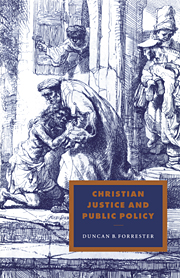Book contents
- Frontmatter
- Contents
- General editors' preface
- Preface
- Introduction
- PART I JUSTICE IN DISPUTE
- PART II POLICIES AND PRACTICES
- PART III THEORIES AND THEOLOGIES
- 5 Fairness is not enough
- 6 Justice and the market
- 7 Communication, gender and justice
- PART IV THEOLOGICAL FRAGMENTS
- Select bibliography
- Subject index
- Name index
- CAMBRIDGE STUDIES IN IDEOLOGY AND RELIGION
7 - Communication, gender and justice
Published online by Cambridge University Press: 02 November 2009
- Frontmatter
- Contents
- General editors' preface
- Preface
- Introduction
- PART I JUSTICE IN DISPUTE
- PART II POLICIES AND PRACTICES
- PART III THEORIES AND THEOLOGIES
- 5 Fairness is not enough
- 6 Justice and the market
- 7 Communication, gender and justice
- PART IV THEOLOGICAL FRAGMENTS
- Select bibliography
- Subject index
- Name index
- CAMBRIDGE STUDIES IN IDEOLOGY AND RELIGION
Summary
If it is in fact the ‘first principle of society’, the quality that holds a decent community together, it is not at all surprising that justice is commonly understood as relational, that is, as having to do with the ties which bind people together, the links of responsibility and rights and affection that make a number of people into a community. These relationships and ties are forms of communication; for community to exist, communication must take place, and the quality and nature of that communication determines whether there is justice in the community or not.
As we have seen in the previous two chapters, a great deal of thought about society starts with the individual, or is individualistic through and through. Society, for individualist thought, is primarily a device for safeguarding individuals and assisting them in the fulfilment of their personal purposes; a just society is one that performs these functions well. There have been strenuous protests against the individualistic rationalism which is characteristic of most post-Enlightenment social thought, particularly from those thinkers who are labelled ‘communitarian’ – Alasdair Maclntyre, Charles Taylor, Michael Sandel, Stanley Hauerwas and others. The main focus of this chapter, however, will be not on the communitarians, but on Jürgen Habermas, a major and extraordinarily prolific thinker who affirms and endeavours to continue what Maclntyre has called ‘the Enlightenment Project’ and rejects the communitarians' critique of liberalism, while taking with the utmost seriousness the fact that human beings are communicators and can only be understood in relationships and in community. Communicative action and solidarity are indeed the foundations of his account of justice, the principles of which he believes to be latent in the processes of communication which bind people together.
- Type
- Chapter
- Information
- Christian Justice and Public Policy , pp. 165 - 192Publisher: Cambridge University PressPrint publication year: 1997



